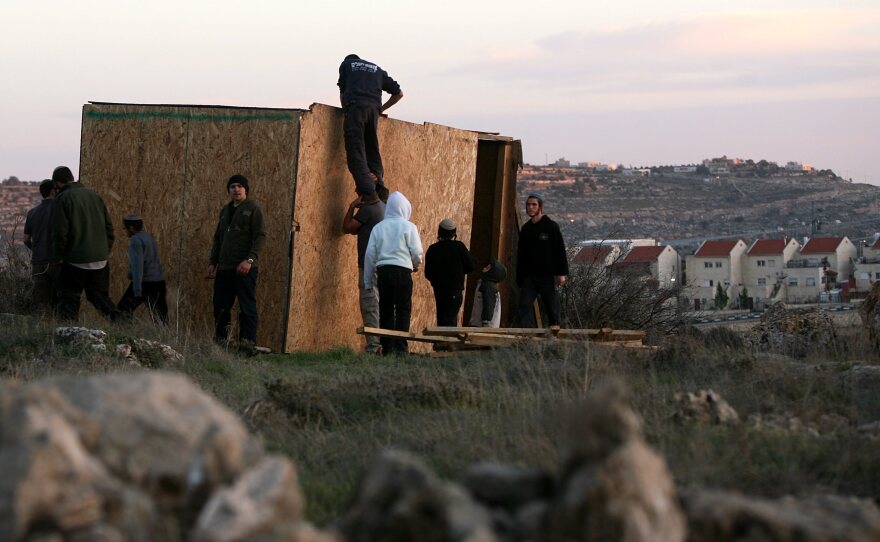

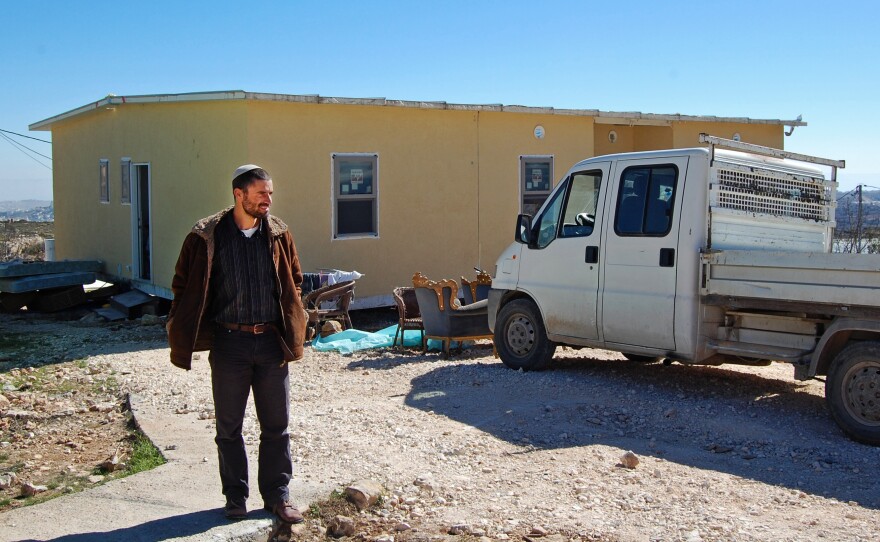
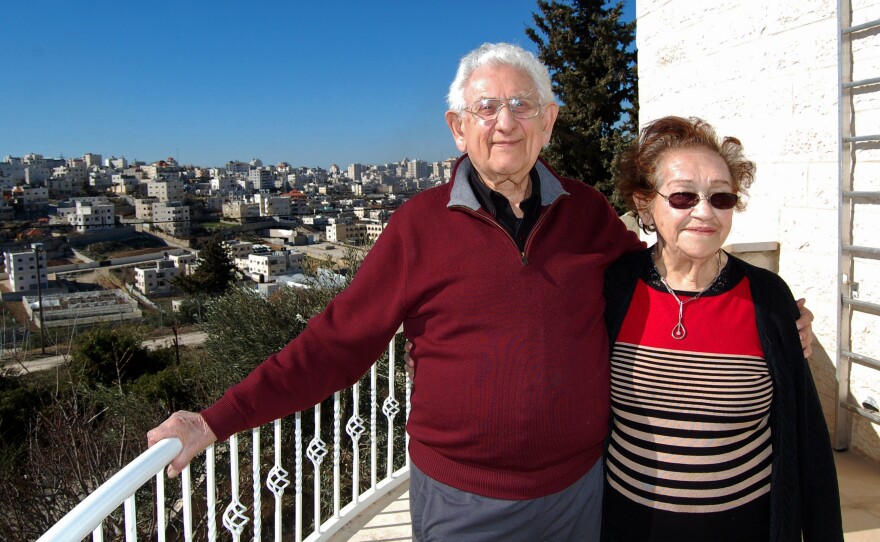
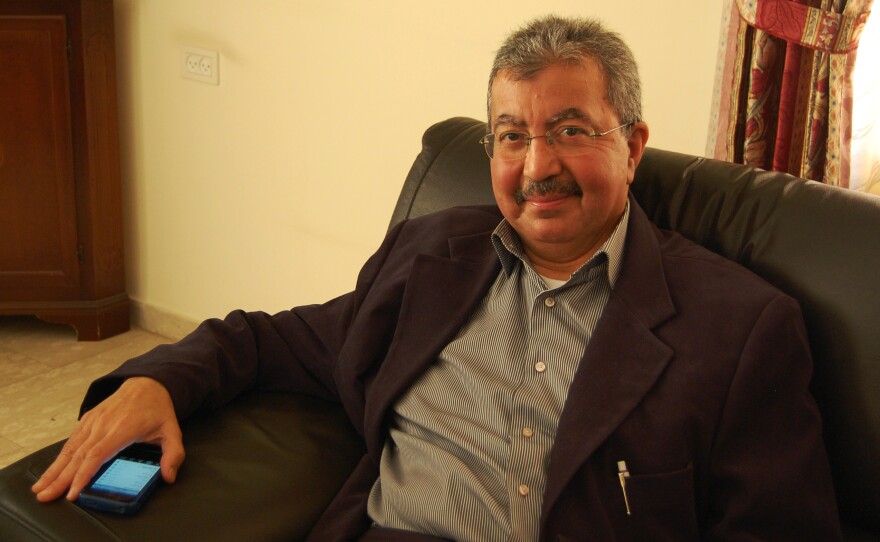
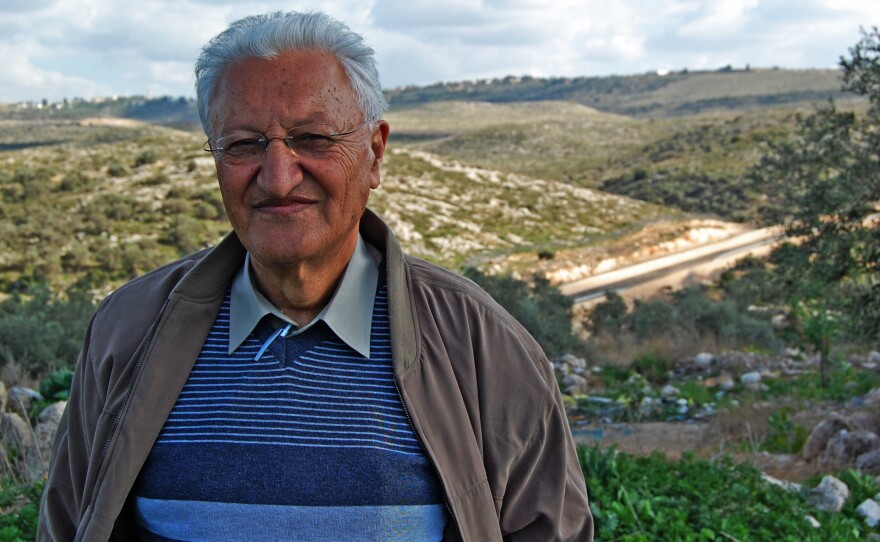
More than 1 million Arabs are citizens of Israel. And over the years, some 350,000 Jewish Israelis have moved to settlements in the West Bank. If the Israelis and Palestinians were to make peace and set a formal border, what would happen to all these people?
The Arabs, most of them Palestinians, mostly belong to families that stayed in their homes that wound up on the western, or Israeli side, of the ceasefire line following the 1948 war at Israel's declaration of independence. They hold Israeli passports and enjoy the rights of citizenship. But many experience discrimination and a challenging sense of dual identity.
The Jewish Israeli settlers in the West Bank live on land that Israel's military has occupied since the 1967 war. They have chose these homes for a variety of reasons: religious, Zionist and economic. Palestinians — and most of the world — consider the ceasefire line, known as the Green Line, as the basis for a future border dividing Israel and a Palestinian state, and the Jewish settlements, guarded by Israeli soldiers, illegally built in occupied territory.
Like many settlers, Nachum Pechenick wants to continue living in the West Bank. But unlike most others, he is not lobbying for a peace deal that puts his home on the Israeli side of a future border.
Pechenick says he wants to be a Palestinian citizen. Eventually, the 41-year-old wants to serve in the Palestinian parliament.
"It's a favor for us," he says. "It's also a favor for the Palestinians, because minorities are important to democracy."
He calls it a "simple" concept, but admits it would be very difficult to implement, given high emotions on both sides. But the Israeli soldiers would go, in Pechenick's vision. He says real peace would mean Jews living among Palestinians would not need special protection.
An old-time settler, from the same settlement where Pechenick was born and raised, calls the idea noble, but naïve.
Elyakim Haetzni, 87, left Hitler's Germany as a child and was wounded fighting in Israel in 1948. He moved to Kiryat Arba, a settlement next to the West Bank city of Hebron, to help rebuild a Jewish presence in the area after Israel captured the city in 1967. He is determined to stay where he is, as an Israeli citizen under Israeli protection.
If the Israeli government signs a peace deal, he says, "they must stipulate how they protect us. If the stipulation is the Arab party undertakes to protect the life of the Jews, then we can already write our wills."
He laughs — a robust guffaw — when he says this.
Palestinian officials say they would welcome any individual to apply for Palestinian citizenship, but insist the Jewish settlements won't stay.
They're not sure how they would view an individual like Pechenick — a second-generation settler who has built his home in an "outpost" settlement, considered illegal even by the Israeli government, yet who works with Palestinians on joint projects for peace.
Pechenick's motivation to stay put isn't, in his words, "to control the land."
"I want to stay here because I love my motherland," he says. "I want to be here where it's a good neighborhood with my Palestinian neighbor."
On the other side of the fence-and-wall barrier Israel built in and around the West Bank, Arab-Israelis are having a similar debate. If they had a chance to live in an independent Palestinian state, would they?
Yassar Shpeta would move as soon as the state was created. An Israeli citizen, he is tired of feeling a stranger in his own country, he says.
"The way authorities treat me, they give me the feeling I am not welcome here," he says. "When I'm leaving through the airport, I get special treatment. When my house was robbed I got different treatment from the police. I feel that I need to fight for everything."
Shpeta, 56, lives in a mixed Arab-Jewish community in Israel specifically designed to promote peace. He is married to a Jewish-Israeli woman — and he's not sure she'd move to a Palestinian state with him. Still, that wouldn't stop him, he says.
"I hope there would be a relationship between the two states and we could visit each other, but after 56 years in Israel, I think I would feel at home in a Palestinian state," he says.
Other Palestinian-Israelis say they would stay in Israel.
Zuhair Tibi, a family physician, is also Palestinian-Israeli. He calls discrimination in Israel "structural" and sees it in education, public infrastructure and planning, and job opportunities. But he wouldn't move to a Palestinian state.
"We can't do that," he says. "To move means to leave our home. We can't leave our home. Because we are deeply connected to this place."
By "this place," Tibi doesn't only mean Taibe, the Arab town in Israel where he was born and still lives today, across the barrier from the West Bank city of Tulkarem. He means places throughout Israel: the old port city of Jaffa where his mother grew up, the beach town of Netanya where he manages a clinic, anywhere he has friends, family or memories. He expects if he chose to live in a new Palestinian state, he'd be cut off from these places, as Palestinians in the West Bank are now.
Like the extended family of 70-year-old Hussein Jbara. Standing on a dry hillside in Israel, Jbara points to a similar hill on the far side of the Israeli barrier that separates him from family who live in the West Bank. He fears a Palestinian state might not be governed in a way he would like.
"Like the Syrian government, like the Jordan kingdom, like Saudi Arabia. My vision is something different ... democratic, liberated, industrialized," Jbara says. "It takes many years to make a Palestinian state like what I want."
Jbara has lived in Israel his entire life — but it's possible his property could wind up on the Palestinian side.
Israel's foreign minister, Avigdor Lieberman, proposes drawing a border that would put land that's home to tens of thousands of Arab-Israelis into Palestinian territory. Israeli legal experts say it would have to be done with Palestinian consent.
Diya Yahaya, a 26-year-old who also lives in Taibe, didn't pay much attention to Lieberman's proposal. He says talk of reducing Israel's Arab population is nothing new. He knows he's glad not to live in the West Bank now. It's hard to find work there, he says, and under the military occupation, it can be dangerous.
"Sometimes it's chaos," he says. "Here, even though we are Arabs in a Jewish state, there's more security and more opportunity."
But what if there was no occupation, and Palestinians ran their own country? He thinks he might feel out of place, as he does when he visits the West Bank now.
"As an Arab-Israeli, I feel discrimination in the West Bank, too," he says. "They treat me differently. I don't really feel at home in either place."
Copyright 2014 NPR. To see more, visit http://www.npr.org/






